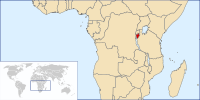Portal:Burundi
The Burundi PortalA view of Bujumbura, Burundi
Burundi (/bəˈrʊndi/ , /-ˈrʌn-/), officially the Republic of Burundi (Kirundi: Repubulika y’Uburundi,[1] [u.βu.ɾǔː.ndi]; Swahili: Jamuhuri ya Burundi; French: République du Burundi}}, [buʁundi] or [byʁyndi]), is a landlocked country in the Great Rift Valley where the African Great Lakes region and East Africa converge. It is bordered by Rwanda to the north, Tanzania to the east and southeast, and the Democratic Republic of the Congo to the west; Lake Tanganyika lies along its southwestern border. The capital cities are Gitega and Bujumbura, which is also the largest city.[2] One of the smallest countries in Africa, Burundi's land is used mostly for subsistence agriculture and grazing, which has led to deforestation, soil erosion and habitat loss.[3] As of 2005 the country was almost completely deforested, with less than 6% of its land covered by trees and over half of that being commercial plantations.[4] In addition to poverty, Burundi often suffers from corruption, weak infrastructure, poor access to health and education services, and hunger.[5] Burundi is densely populated and many young people emigrate in search of opportunities elsewhere. The World Happiness Report 2018 ranked the nation as the world's least happy with a rank of 156.[6] Burundi is a member of the African Union, Common Market for Eastern and Southern Africa, United Nations and the Non-Aligned Movement. Selected article -The origins of the Hutu, Tutsi and Twa peoples is a major issue of controversy in the histories of Rwanda and Burundi, as well as the Great Lakes region of Africa. The relationship among the three modern populations is thus, in many ways, derived from the perceived origins and claim to "Rwandan-ness". The largest conflicts related to this question were the Rwandan genocide, the Burundian genocide (Hutu and Tutsi), and the First and Second Congo Wars. Ugandan scholar Mahmoud Mamdani identifies at least four distinct foundations for studies that support the "distinct difference between Hutu and Tutsi" school of thought: phenotype and genotype, cultural memory of inhabitants of Rwanda, archeology, and linguistics. (Full article...) General images -The following are images from various Burundi-related articles on Wikipedia.
More Did you know (auto generated)
Did you know -
Wiki Loves Africa in Burundi
CategoriesRelated portalsWikiProjectsSelected picture -TopicsAssociated WikimediaThe following Wikimedia Foundation sister projects provide more on this subject:
Sources
Discover Wikipedia using portals | ||||














































